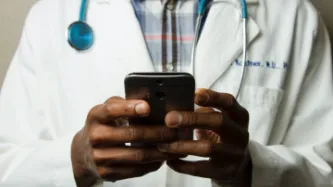Search
Content type: Long Read
IntroductionHarnessing new digital technology to improve people’s health is now commonplace across the world. Countries and international organisations alike are devising digital health strategies and looking to emerging technology to help solve tricky problems within healthcare. At the same time, more and more start-ups and established tech companies are bringing out new, and at times innovative, digital tools aimed at health and wellbeing.
Content type: Long Read
Table of contentsIntroductionWeighing the (potential) benefits with the risksPrivacy rights and the right to healthThe right to healthPrivacy, data-protection and health dataThe right to health in the digital contextWhy the drive for digitalImproved access to healthcarePatient empowerment and remote monitoringBut these same digital solutions carry magnified risks…More (and more connected) dataData leaks and breachesData sharing without informed consentProfiling and manipulationTools are not…
Content type: Long Read
For over 20 years with the start of the first use of ICTs in the 1990s, we have seen a digital revolution in the health sector. The Covid-19 pandemic significantly accelerated the digitalisation of the health sector, and it illustrates how fast this uptake can be and what opportunities can emerge; but also, importantly, the risks that it involves.
As we've said many times before, whilst technologies can be part of the solution to tackle some socio-economic and political challenges facing our…
Content type: News & Analysis
Back in 2019, UK Health Secretary Matt Hancock announced a partnership between the NHS and Amazon Alexa. The goal of the partnership was for Alexa to be able to use the content of the NHS website when people asked health-related questions.At the time, we expressed a number of concerns regarding this agreement: Amazon did not appear to be an actor that should be trusted with our health information, and seeing the Health Secretary publicly praising this new agreement appeared to give…
Content type: Explainer
At first glance, infrared temperature checks would appear to provide much-needed reassurance for people concerned about their own health, as well as that of loved ones and colleagues, as the lockdown is lifted. More people are beginning to travel, and are re-entering offices, airports, and other contained public and private spaces. Thermal imaging cameras are presented as an effective way to detect if someone has one of the symptoms of the coronavirus - a temperature.
However, there is little…
Content type: News & Analysis
This week, we read that a former Apple contractor who blew the whistle on the company’s programme to listen to users’ Siri recordings has decided to go public, in protest at the lack of action taken as a result of the July 2019 disclosures. The news adds to a series of revelations that have been reported over the past months.
While the issue raises serious questions regarding the compatibility of such practices with data protection laws, at the same time, it highlights a wider problem that…
Content type: Long Read
This week saw the release of a coronavirus tracking app within the United Kingdom, initially to be trialled in the Isle of Wight. Privacy International has been following this closely, along with other ‘track and trace’ apps like those seen in over 30 other countries.
The UK’s app is no different. It is a small part of a public health response to this pandemic. As with all the other apps, it is vital that it be integrated with a comprehensive healthcare response, prioritise people, and…
Content type: Long Read
On 12 April 2020, citing confidential documents, the Guardian reported Palantir would be involved in a Covid-19 data project which "includes large volumes of data pertaining to individuals, including protected health information, Covid-19 test results, the contents of people’s calls to the NHS health advice line 111 and clinical information about those in intensive care".
It cited a Whitehall source "alarmed at the “unprecedented” amounts of confidential health information being swept up in the…
Content type: News & Analysis
This week International Health Day was marked amidst a global pandemic which has impacted every region in the world. And it gives us a chance to reflect on how tech companies, governments, and international agencies are responding to Covid-19 through the use of data and tech.
All of them have been announcing measures to help contain or respond to the spread of the virus; but too many allow for unprecedented levels of data exploitation with unclear benefits, and raising so many red flags…
Content type: Report
The changes discussed in this article are based on a second analysis performed in late November, 3 months after the original study Your Mental Health is for Sale and following the exact same methodology. All data collected can be found at the bottom of this page.
Change is possible
Back in September 2019 we published the report Your Mental Health is for Sale exposing how a majority of the top websites related to mental health in France, Germany and the UK share data for advertising purposes.…
Content type: Long Read
Following a series of FOI requests from Privacy International and other organisations, the Department of Health and Social Care has now released its contract with Amazon, regarding the use of NHS content by Alexa, Amazon’s virtual assistant. The content of the contract is to a big extent redacted, and we contest the Department of Health’s take on the notion of public interest.
Remember when in July this year the UK government announced a partnership with Amazon so that people would now…
Content type: Long Read
A new study by Privacy International reveals how popular websites about depression in France, Germany and the UK share user data with advertisers, data brokers and large tech companies, while some depression test websites leak answers and test results with third parties. The findings raise serious concerns about compliance with European data protection and privacy laws.
This article is part of a research led by Privacy International on mental health websites and tracking. Read our…











